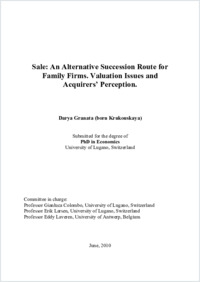Sale : an alternative succession route for family firms : Valuation issues and acquirers’ perception
- Granata, Darya
- Colombo, Gianluca (Degree supervisor)
-
25.06.2010
116 p
Thèse de doctorat: Università della Svizzera italiana, 2010 (jury note: Magna cum laude)
Family business sale
Valuation
Matched-pairs
Multiples
Private equity
Exploratory research
Content analysis
Risk
Survey
English
Family firms form the majority of organizations around the world, but only few survive beyond the first generation. However, very little has been said about succession routes alternative to intergenerational transfer. This thesis focuses on sale of family businesses, with a particular emphasis on valuation and acquirers’ perception of family firm targets. In order to cope with the research objective, a variety of methods were implemented, some of which have never been employed in previous family business studies. The research is divided into the following three chapters, each one corresponding to a paper: 1. Measures of Value in Acquisitions: Family versus Non-Family Businesses 2. Family Firms in the Eyes of Private Equity Companies 3. Family Firms – Risky Acquisition Targets? The focus of the first paper is to compare valuations of privately-held family versus non-family business targets in the acquisition context. Our main finding is that although most theoretical and empirical research explicitly recognizes the prevalence and superior performance of family businesses around the world, acquirers are unable to recognize the advantages associated with family businesses and thus acquire them at a discount as compared to non-family business counterparts. The second and third papers analyze the perception of family firm targets by an important class of acquirers, private equity firms. Family firm targets are perceived to be riskier by their acquirers and this can have negative influence on the valuation. It is concluded that the perception of risk, even though not always corresponding to the actual levels of risk, influences investors’ behavior.
- Language
-
- English
- Classification
- Economics
- License
-
License undefined
- Identifiers
-
- RERO DOC 20387
- URN urn:nbn:ch:rero-006-109363
- ARK ark:/12658/srd1318148
- Persistent URL
- https://n2t.net/ark:/12658/srd1318148
Statistics
Document views: 364
File downloads:
- Texte intégral: 279
